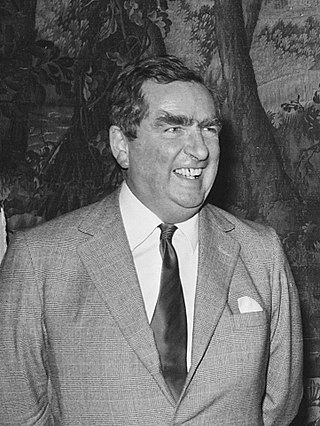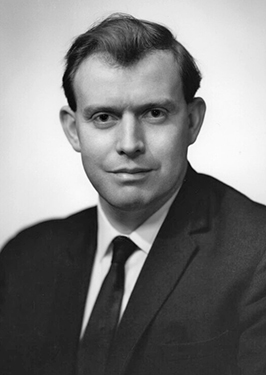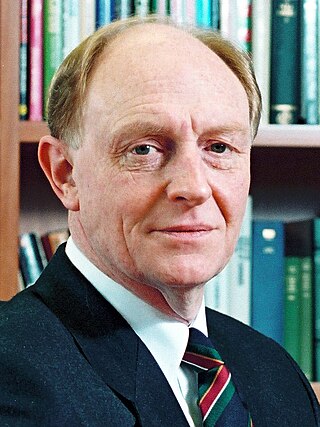Related Research Articles

Michael Mackintosh Foot was a British politician who served as Leader of the Opposition and Leader of the Labour Party from 1980 to 1983. Foot began his career as a journalist on Tribune and the Evening Standard. He co-wrote the 1940 polemic against appeasement of Hitler, Guilty Men, under a pseudonym.

The 1983 United Kingdom general election was held on Thursday 9 June 1983. It gave the Conservative Party under the leadership of Margaret Thatcher the most decisive election victory since that of the Labour Party in 1945, with a majority of 144 seats and the first of two consecutive landslide victories.

Roy Sydney George Hattersley, Baron Hattersley, is a British politician, author and journalist from Sheffield. A member of the Labour Party, he was MP for Birmingham Sparkbrook for over 32 years from 1964 to 1997, and served as Deputy Leader of the Labour Party from 1983 to 1992.

Denis Winston Healey, Baron Healey, was a British Labour Party politician who served as Chancellor of the Exchequer from 1974 to 1979 and as Secretary of State for Defence from 1964 to 1970; he remains the longest-serving Defence Secretary to date. He was a Member of Parliament from 1952 to 1992, and was Deputy Leader of the Labour Party from 1980 to 1983. To the public at large, Healey became well known for his bushy eyebrows, his avuncular manner and his creative turns of phrase.

Bruce Millan was a British Labour politician who served as a European Commissioner from 1989 to 1995.

Eric Graham Varley, Baron Varley, was a British Labour Party politician and cabinet minister on the right-wing of the party. He was the Member of Parliament for Chesterfield from 1964 to 1984.

Eric Samuel Heffer was a British socialist politician. He was Labour Member of Parliament for Liverpool Walton from 1964 until his death. Due to his experience as a professional joiner, he made a speciality of the construction industry and its employment practices, but was also concerned with trade union issues in general. He changed his view on the European Common Market from being an outspoken supporter to an outspoken opponent, and served a brief period in government in the mid-1970s. His later career was dominated by his contribution to debates within the Labour Party and he defended the Liverpool City Council.
The 1983 Labour Party leadership election was an election in the United Kingdom for the leadership of the Labour Party. It occurred when then leader Michael Foot resigned after winning only 209 seats at the 1983 general election, a loss of 60 seats compared to their performance at the previous election four years earlier. This was the worst showing for Labour since 1935 until 2019.
The 1976 Labour Party leadership election occurred when Harold Wilson resigned as Leader of the Labour Party and Prime Minister. It is the only occasion when the Labour Party, whilst in government, has had a leadership election with more than one candidate.
The 1980 Labour Party leadership election was held following the resignation of James Callaghan, who had been Prime Minister from 1976 to 1979 and had stayed on as leader of the Labour Party for eighteen months in order to oversee an orderly transition to his favoured successor, Denis Healey, over his own deputy Michael Foot. However, during this period the party had become bogged down in internal arguments about its procedures and future direction.
The 1988 Labour Party leadership election saw Tony Benn, identified with the left wing of the British Labour Party, challenge the incumbent leader Neil Kinnock identified with the more moderate social democratic wing.
The 1981 Labour Party deputy leadership election took place on 27 September 1981 when Tony Benn unsuccessfully challenged the incumbent deputy leader Denis Healey at the party conference. Healey had been elected unopposed as deputy leader in the previous year.

Neil Kinnock was Leader of the Labour Party and Leader of the Opposition from 2 October 1983 to 18 July 1992. He convincingly defeated Roy Hattersley, Eric Heffer, and Peter Shore in the 1983 leadership election, which was prompted by Michael Foot's resignation following the disastrous general election result earlier that year. Kinnock's period as Leader encompassed the bulk of the Thatcher premiership and the first two years of the Major premiership. Kinnock resigned in 1992 after losing his second election as Leader.

Michael Foot was Leader of the Opposition from 4 November 1980, following his victory in the 1980 leadership election, to 2 October 1983, when he was replaced by Neil Kinnock at the 1983 leadership election. The 1980 leadership contest was triggered by James Callaghan's loss at the 1979 general election, and the 1983 contest by Foot's own disastrous defeat in the 1983 general election.
Elections to the Labour Party's Shadow Cabinet occurred on 14 June 1979, following the Party's fall from power at the May general election that year. In addition to the 12 members elected, the Leader, Deputy Leader, Labour Chief Whip, Labour Leader in the House of Lords, and Chairman of the Parliamentary Labour Party were automatically members.

James Callaghan became Leader of the Opposition on 4 May 1979 after losing the 1979 election and remained in that office until Michael Foot was elected Leader of the Labour Party on 2 October 1980. Callaghan named his Shadow Cabinet in June 1979, with Foot and the 12 elected members of the Shadow Cabinet assigned portfolios on 14 June and further appointments made on 18 June. From the opening of Parliament until that date, Callaghan's Cabinet, with a few exceptions, stayed on to shadow their former positions.
Elections to the Labour Party's Shadow Cabinet took place on 19 November 1981. There were 15 posts, rather than 12 as in previous years. In addition to the 15 members elected, the Leader, Deputy Leader, Labour Chief Whip, Labour Leader in the House of Lords, and Chairman of the Parliamentary Labour Party were automatically members.
Elections to the Labour Party's Shadow Cabinet took place on 18 November 1982. In addition to the 15 members elected, the Leader, Deputy Leader, Labour Chief Whip, Labour Leader in the House of Lords, and Chairman of the Parliamentary Labour Party were automatically members.
A deputy leadership election for the Labour Party in the United Kingdom took place on 2 October 1983 to replace incumbent Deputy Leader Denis Healey. Healey had served in the position since 1980, becoming deputy leader at the same time that Michael Foot became party leader. Foot and Healey had both announced their resignations after the general election on 9 June 1983, in which a disastrous performance left the Labour Party with just 209 seats in parliament.
The 2015 Labour Party deputy leadership election was triggered on 8 May 2015 by the resignation of Harriet Harman as Deputy Leader of the Labour Party of the United Kingdom following the party's defeat at the 2015 General Election. Harman, the Deputy Leader of the Labour Party, became Acting Leader following Leader Ed Miliband's resignation. Harman announced on the same day that she would step down as Deputy Leader, with her resignation taking effect when the new Leader and Deputy Leader are elected.
References
- ↑ "Labour rebel quits shadow cabinet". The Vancouver Sun. Vancouver, British Columbia. Associated Press. p. A9.
- ↑ Geoffrey Parkhouse (5 December 1980). "Benn the top loser out in the cold". The Glasgow Herald. p. 1.
- ↑ Geoffrey Parkhouse (20 November 1981). "Size of Benn vote a blow to Foot". The Glasgow Herald. p. 1.
